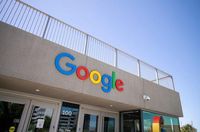In a remarkable display of resilience amidst economic uncertainty, Alphabet Inc., the parent company of Google and YouTube, reported first-quarter earnings that exceeded expectations, showcasing the strength of its core advertising business and significant advancements in artificial intelligence. On April 24, 2025, the company announced that its revenue for the quarter reached $90.23 billion, surpassing analyst projections of $89.12 billion. This marks a 12% increase year-over-year, with net income soaring to $34.54 billion, or $2.81 per share, compared to forecasts of $2.01 per share.
CEO Sundar Pichai attributed the strong performance to a "unique full stack approach to AI," which has been instrumental in driving growth across various segments. The search unit alone generated $50.7 billion in sales, slightly above the expected $50.5 billion, while Google Cloud revenue came in at $12.26 billion, aligning with analyst estimates. Pichai emphasized the importance of AI advancements, stating, "This quarter was super exciting as we rolled out Gemini 2.5, our most intelligent AI model, which is achieving breakthroughs in performance and is an extraordinary foundation for our future innovation."
One of the standout features, AI Overviews, has gained significant traction, now boasting over 1.5 billion users each month. This tool, which provides users with summarized information above traditional search results, has become a key driver of engagement and revenue for the company. Philipp Schindler, Google's chief business officer, noted that the continued expansion of AI Overviews and its monetization potential are pivotal for future growth.
Despite the positive results, Alphabet faces challenges stemming from external economic factors. The impending end of the de minimis trade exemption, which allows low-value packages from Asia to enter the U.S. duty-free, is expected to create headwinds for the advertising business, particularly from Asian retailers. Schindler remarked, "The changes to de minimis exemption will obviously cause a slight headwind to our ads business in 2025, primarily from APAC-based retailers." This shift could impact spending from major advertisers like Chinese e-commerce platforms Temu and Shein.
In addition to its robust earnings, Alphabet announced a significant stock buyback program of $70 billion, further boosting investor confidence and pushing shares up by over 4% in after-hours trading. The company also reaffirmed its commitment to invest approximately $75 billion in capital expenditures throughout the year, focusing on enhancing its AI infrastructure.
As part of its ongoing efforts to expand its AI capabilities, Alphabet has made substantial investments in its technical infrastructure, with $17.2 billion allocated in the first quarter alone. This investment reflects a 43% increase compared to the same period last year and underscores the company's dedication to maintaining its competitive edge in the rapidly evolving tech landscape.
Waymo, Alphabet's self-driving car unit, continues to expand its services, now providing over a quarter of a million fully autonomous paid rides each week, a fivefold increase from the previous year. This growth is bolstered by recent expansions into Silicon Valley and Austin, with plans to launch in Atlanta and Washington, D.C., by 2026.
On the YouTube front, the platform celebrated the 20th anniversary of its first video upload. The milestone highlights YouTube's evolution into a global phenomenon, now boasting over 1 billion monthly active podcast users and a subscriber base exceeding 125 million for YouTube Music and Premium services. Despite facing challenges in advertising revenue, which fell slightly short of estimates at $8.93 billion, YouTube remains a central pillar of Alphabet's business strategy.
Analysts are cautiously optimistic about Alphabet's future, noting that the company's strong performance in search and cloud services positions it well amidst increasing competition from generative AI platforms. Thomas Monteiro, a senior analyst at Investing.com, remarked, "When you combine the numbers seen today with Alphabet's also solid cloud performance, it leaves few doubts about the company's leading position in the AI search revolution."
However, the company is not without scrutiny. Ongoing antitrust investigations continue to loom, with recent rulings indicating that Google holds an illegal monopoly in specific online advertising markets. A federal judge's ruling emphasized that Google has engaged in anticompetitive practices to maintain its dominance, and the company is currently navigating a remedies trial to address these concerns.
As Alphabet moves forward, the integration of AI into its core operations will be crucial. The company's commitment to innovation, alongside its strategic investments in AI and infrastructure, aims to solidify its position as a leader in the technology sector. With its sights set on future growth, Alphabet is poised to adapt to the challenges and opportunities that lie ahead.
In summary, Alphabet's first-quarter earnings reflect a robust performance driven by its advertising and AI initiatives, even as external economic factors present challenges. The company's proactive approach, marked by significant investments and strategic expansions, positions it well for continued success in the evolving tech landscape.





